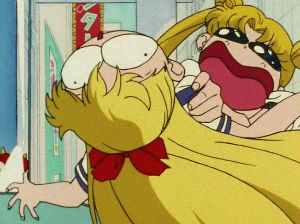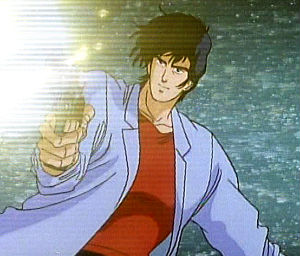

Quick Links:
Four Anime Buried Under Fenway Park
Sailor Moon:
If there's one thing to be said about Sailor Moon fans, it's that they are unquestionably devoted to their favorite series. Most are also batshit loco, but that's another story for another day. Sailor Moon is currently one of the most sought-after DVD series on the market, despite parts of the show receiving a decently wide circulation.
Sailor Moon originally aired on American (and Canadian) TV in a heavily edited format, courtesy of Dic. After the seeds of the initial run were sown, the legion began to amass slowly but surely. Pioneer Animation introduced fans to the darker, sometimes racier side of the series in 2001, when they released the first uncut volume of Sailor Moon S. Suddenly, Neptune and Uranus weren't Alabama-style "cousins" anymore, and characters weren't simply "banished to the Negaverse." Instead, the senshi were finally identified as lovers, and characters actually freakin' died. Both Sailor Moon S and SuperS were released to much fanfare, and saw outstanding sales over a number of releases.The original series wasn't as fortunate, though. ADV Films previously released the dubbed DVDs for the original Sailor Moon in the US. However, the uncut series seemed to be a no-go, as Toei was unwilling to negotiate, and American companies didn't have pockets deep enough to pay the licensing fees. A miracle for the fans came about in 2002, however, when ADV's Dave Williams announced that the company snagged the rights to both Sailor Moon and Sailor Moon R in their uncut, unedited form. At this point, the internet became a critical mass - fans were squealing, non-fans were groaning, and everyone else just wanted both sides to shut the hell up.
The first set contained all 46 episodes of the original Sailor Moon, and was released in 2003. The set was heavily flawed, though. Instead of the new masters used in Japan's (at the time) recent re-release of the show, Toei shoved old, decayed masters into the hands of ADV. Grainy, dirty film coupled with distored mono audio that made old fansub tapes seem superior in quality. However, the set still sold, and sold well.
In 2004, Geneon and ADV both revealed that Toei was not renewing the licenses for any Sailor Moon product, and that all DVD properties would lapse by 2005. This triggered a buying frenzy among fans, collectors, and eBay sharks, who snapped up the show quickly. Within weeks of the license lapse, Sailor Moon was simply unavailable, despite demand.
Sailor Moon fetches a princely sum on eBay, Amazon, or other outlets due to the rarity. ADV's sets for the original series often hit upwards of $200, often settling between $250 and $600 per set. Geneon's sets, due to numerous rereleases, often fetch far lower values. Singles of S and SuperS can be found at prices that range from $18 to $25. However, complete sets of the shows often run between $200 and $300.
City Hunter:
City Hunter is the perfect example of a show that was doomed from the start. Before its US release, ADV solicited fans for pledges to purchase the series. By "pledge," I don't mean signing a document that says "I promise I'll buy this! I really really do, sir!" ADV required a preorder - credit card information was collected, and billed as soon as the DVDs shipped. The preorder prices for each volume began at $124.98, and would drop with preorder volume - an absolute minimum for each set was 2,000 units.
The first two seasons of the show performed strongly, and a decently large number of sets were released to retail with a suggested price of $89.98. City Hunter 3 and 91, however, are an entirely different story. Both City Hunter 3 and 91, due to a number of unknown factors, were shipped in exponentially lower quantities than the first two seasons. The collectors snapped them up quickly, and the shows weren't restocked. The licenses for all City Hunter shows lapsed ages ago, which means that whatever hit the market was all that fans could get.City Hunter is a series that varies in rarity. The first season and all of the movies are incredibly easy to obtain. City Hunter 1 typically fetches $13 to $30 per 5-disc set, while the films can be had for $2 to $4 each. City Hunter 2 is a bit less common, with prices ranging from $20 to $50 per set. The fun begins with City Hunter 3 and '91. City Hunter 3 is the less rare of the two, and often fetches from $120 to $200. City Hunter '91 is the most difficult to find of the series - it wouldn't be uncommon to pay $200 to $500 for this 3-disc, 13-episode set.
Cardcaptor Sakura:
This series has three factors that ensure its collectability: It's a CLAMP show, it had a stellar cast, and it was freakin' long. Cardcaptor Sakura spanned 70 episodes, which were released across 18 volumes in America. Pioneer Animation released the series from 2000 to 2003 and, at the beginning the series fared well in the marketplace. Chad Kime, former Pioneer Marketing Director revealed that the show's performance was halved after the company was pressured to release volumes 4 and 5 out of order. The show still sold fairly well after that point, but nowhere near what the company hoped.
Cardcaptor Sakura is somewhat rare, but earlier volumes are still obtainable. Single volumes vary in price, from $9 to $150, with later volumes fetching progressively higher prices.
Gunsmith Cats:
Gunsmith Cats is a series that should have had more appeal in America than it did. It was a straight-forward, no-nonsense cop flick, spread across three OVAs. From all indicators, the show performed decently - at least enough to warrant a remastered DVD edition. Licensing issues arose however, and the title became very sparse on the market very quickly. David Williams explained to me that, while the DVD sold decently, ADV was simply unable to renew the license with the Japanese copyright holders.
Gunsmith Cats is fairly rare in the market today, with new copies ranging from $60 to $300. Used copies fluctuate in value between $40 and $60.
Personally, I spent close to two years hunting down a copy of the Gunsmith Cats DVD. Having snatched up the omnibus manga volumes and a copy of Riding Bean, I just had to get one more fix of Minnie May and Rally's exploits. However, price is the ultimate equalizer. There is simply no way I could rationalize spending the price given on one OVA. My fortunes turned at this year's Anime Boston, however, when I found a copy of the feature for sale at Dave Williams's booth for $60. At the time, I only had $50 to spend. I threw out an offer and, thankfully, Mr. Williams accepted it. Once again, I want to say "Thank you!" to Section23's David Williams, for giving me that one last fix.



